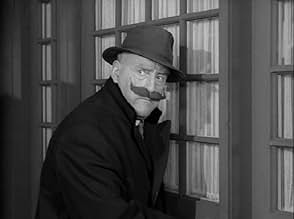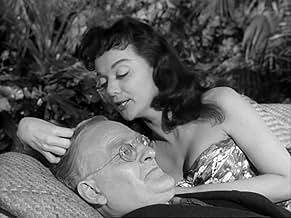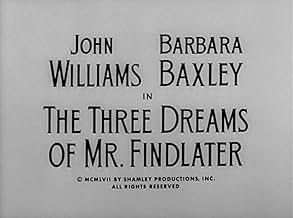Ernest Findlater is constantly nagged at by his wife so he fantasizes about Lalage, an exotic lover from the South Seas.Ernest Findlater is constantly nagged at by his wife so he fantasizes about Lalage, an exotic lover from the South Seas.Ernest Findlater is constantly nagged at by his wife so he fantasizes about Lalage, an exotic lover from the South Seas.
- Director
- Writers
- All cast & crew
- Production, box office & more at IMDbPro
6.4679
1
2
3
4
5
6
7
8
9
10
Featured reviews
Entertaining but pointless.
John Williams must have appeared in more episodes of "Alfred Hitchcock Presents" than nearly everyone...except for Alfred's daughter, Patricia. So, seeing Williams in an episode only a few after he starred in three straight isn't all that surprising.
In "The Three Dreams of Mr. Findlater", he plays Ernest Findlater, a mousy and rather dull man with a penchant for retreating into a dreamworld instead of interacting with his cold wife. In this dreamworld, Ernest dreams of a Polynesian girl, Lalage, and a nice tropical island. But she also appears to him at other times and they dream of being together and killing his wife. However, because Ernest is so mousy and timid, he always dreams and plans...but never actually does anything.
There is no twist, no coincidence, no 'Hitchcockian' moment in this one....just the man dreaming of being with his imaginary girlfriend and killing the wife....and nothing more. Interesting to watch but ultimately disappointing.
In "The Three Dreams of Mr. Findlater", he plays Ernest Findlater, a mousy and rather dull man with a penchant for retreating into a dreamworld instead of interacting with his cold wife. In this dreamworld, Ernest dreams of a Polynesian girl, Lalage, and a nice tropical island. But she also appears to him at other times and they dream of being together and killing his wife. However, because Ernest is so mousy and timid, he always dreams and plans...but never actually does anything.
There is no twist, no coincidence, no 'Hitchcockian' moment in this one....just the man dreaming of being with his imaginary girlfriend and killing the wife....and nothing more. Interesting to watch but ultimately disappointing.
Whimsy Without Wit
The Three Dreams Of Mr. Findlater is a lesser Hitch half-hour. As it's adapted from an A.A. Milne story one can't but come to it in high hopes. Those hopes are dashed early on, even with the excellent cast and a potentially promising idea.
Where to begin? Maybe it's best to start by defining the word that best describes the episode: twee. The best dictionary definition I've ever read of that word, seldom used by Americans, fairly common in England, is "whimsy without wit".
The tale of a middle aged man of comfortable means but by no means affluent, and the persistence of his Walter Mitty daydreams of a South Seas woman he wants to run off with so as to ditch his stuffy, conservative wife, is too mundane to really build on.
I suppose we all daydream to one degree or another, and more so than we care to admit, however Mr. Findlater does more than that: he has invented a woman in his mind who's wholly a fantasy and who also talks with him, offers advice, and provides him with, well, not moral support; more like the immoral kind.
When Findlater and his Pacific isle princess begin to seriously plot to murder his wife the story falls apart, as it's reached a point where it's either going to rise into the realm of sophisticated comedy (Not So Blithe Spirit?), or turn into a study of a man descending into psychosis. It cannot, needless to say, be both.
The ending works: it's a modest and ironic save, but that's about it. John Williams puts much effort into the lead but he comes off as too authoritative for such a forlorn character. The rest of the cast is adequate; and in the case of Isobel Elsom as his unpleasant and at times surprisingly perceptive wife, far more than that.
Where to begin? Maybe it's best to start by defining the word that best describes the episode: twee. The best dictionary definition I've ever read of that word, seldom used by Americans, fairly common in England, is "whimsy without wit".
The tale of a middle aged man of comfortable means but by no means affluent, and the persistence of his Walter Mitty daydreams of a South Seas woman he wants to run off with so as to ditch his stuffy, conservative wife, is too mundane to really build on.
I suppose we all daydream to one degree or another, and more so than we care to admit, however Mr. Findlater does more than that: he has invented a woman in his mind who's wholly a fantasy and who also talks with him, offers advice, and provides him with, well, not moral support; more like the immoral kind.
When Findlater and his Pacific isle princess begin to seriously plot to murder his wife the story falls apart, as it's reached a point where it's either going to rise into the realm of sophisticated comedy (Not So Blithe Spirit?), or turn into a study of a man descending into psychosis. It cannot, needless to say, be both.
The ending works: it's a modest and ironic save, but that's about it. John Williams puts much effort into the lead but he comes off as too authoritative for such a forlorn character. The rest of the cast is adequate; and in the case of Isobel Elsom as his unpleasant and at times surprisingly perceptive wife, far more than that.
I'll See Her In My Dreams
I keep trying to enlist the sarong-clad Lalage (Baxley) into my dreams but to no avail. But then poor businessman Findlater (Williams) probably needs her coy ministrations more than I do. What with his shrewish, ice-queen wife (Elsom), no wonder he retreats into a dream world whenever he can. Trouble is he can't seem to control the sarong temptress's comings and goings. So she keeps turning up at odd times, like hotel lobbies. Then too her half-clad posturings are about as seductive as 1950's TV gets. Anyhow, our dreamer keeps having a second unwilled fantasy where his wife dies a sudden, unproblematic death. But since that's not likely to happen, he and his dream girl embark on a murder scheme to escape the impossible wife.
It's tongue-in-cheek the whole way, with material more like The Twilight Zone than standard Hitch. It's also a slightly befuddled John Williams, unlike his usual authoritative roles. I'm not sure what the moral or lesson of the story is, unless it has to do with the power of wish-fulfillment. All in all, the story's a departure and likely a matter of audience taste.
It's tongue-in-cheek the whole way, with material more like The Twilight Zone than standard Hitch. It's also a slightly befuddled John Williams, unlike his usual authoritative roles. I'm not sure what the moral or lesson of the story is, unless it has to do with the power of wish-fulfillment. All in all, the story's a departure and likely a matter of audience taste.
FINDLATER... MUCH, MUCH LATER?
Jules Bricken, who produced the outstanding WWII adventure THE TRAIN, starring Burt Lancaster, brought out the very best of Barbara Baxley in this dark comedy.
A bit off the track for Hitch, but fun to watch. After all these years, it's made me wonder if this was another script he had to defend to the execs at CBS. Hitch did not like talking to the guys upstairs, being an independent producer, but he was working for CBS. Rules are rules.
John Wlliams returns, playing Mr. Findlater(?), saddled with a complaining wife (Isobel Elsom) and his escape are "risque" dreams. The dreams involve temptress Barbara Baxley, wearing a sarong, and not much anything else. His wife also disappears! Of course, it's only a dream, but what happens when Lalage (Baxley) suggests murder? Or was he thinking about murdering the old lady anyway?
Well acted by both leads, certainly restricted to 1950s censorship. And that's where the top brass may have come in to double check the script. Had this been a more contemporary story, and it does have possibilities, this would have been R-rated material for sure. Sarrett Tobias, one of the few female tv writers at the time, turned in a super script once again.
The background music is campy, and precisely at the right moments.
BEST yet opening gag has Hitch telling all his problems to psychiatrist Raymond Bailey, shades of Mr. Drysdale. You have to love it.
From SEASON 2 remastered Universal dvd box set. 2006. Famous green box with green dvds. All seven seasons are now on dvd in a single box set. Released 2022.
A bit off the track for Hitch, but fun to watch. After all these years, it's made me wonder if this was another script he had to defend to the execs at CBS. Hitch did not like talking to the guys upstairs, being an independent producer, but he was working for CBS. Rules are rules.
John Wlliams returns, playing Mr. Findlater(?), saddled with a complaining wife (Isobel Elsom) and his escape are "risque" dreams. The dreams involve temptress Barbara Baxley, wearing a sarong, and not much anything else. His wife also disappears! Of course, it's only a dream, but what happens when Lalage (Baxley) suggests murder? Or was he thinking about murdering the old lady anyway?
Well acted by both leads, certainly restricted to 1950s censorship. And that's where the top brass may have come in to double check the script. Had this been a more contemporary story, and it does have possibilities, this would have been R-rated material for sure. Sarrett Tobias, one of the few female tv writers at the time, turned in a super script once again.
The background music is campy, and precisely at the right moments.
BEST yet opening gag has Hitch telling all his problems to psychiatrist Raymond Bailey, shades of Mr. Drysdale. You have to love it.
From SEASON 2 remastered Universal dvd box set. 2006. Famous green box with green dvds. All seven seasons are now on dvd in a single box set. Released 2022.
Not a dream of an episode
"The Three Dreams of Mr Findlater" is the third and last episode directed by Jules Bricken. The first being "Alibi Me", which was pretty good if not exceptional. The other being "Conversation over a Corpse", which was great and one of the few great episodes of the first half of Season 2. The main reason as to why it was seen was for 'Alfred Hitchcock Presents' regular John Williams, always worth watching and good and more in all but one of his previous outings (the exception being "Whodunnit").
Didn't find myself particularly impressed by "The Three Dreams of Mr Findlater", and it is easily the weakest of Bricken's three 'Alfred Hitchcock Presents' episodes. Can't fault Williams, but the story never really came to life or properly engaged. As far as Season 2 goes, it is not quite one of the weakest episodes but to me it is somewhere around low middle. Average or less ratings and reviews have never been given with pleasure watching and reviewing the 'Alfred Hitchcock Presents' episodes, when disappointed by something it has always intended to be as thoughtful and honest as possible.
By all means there are good things. The best aspect is the performance of Williams, who excels in the type of role he played extremely well throughout his career and his role here plays to his strengths. The acting in general is well above average as is the chemistry between the actors.
Furthermore, Hitchcock's bookending nearly always delights in the series, and it continues to be amusingly ironic. There is some nice photography throughout, though not jaw dropping. The main theme for the series is suitably macabre and the audio doesn't jar or overbear. The premise was very interesting and promising and the episode did start off very well and intriguing.
However, "The Three Dreams of Mr Findlater" could have been a good deal better than it turned out. Just wish that that promise was maintained rather than run out of steam like the episode sadly did. The story drags in the second half from the plotting becoming thinner instead of intricate, and it lacks surprises and suspense (which was expected considering the premise). The ending is not much of one and is very predictable and extremely forgettable. Any revelations are far from big and coincidences are none.
While the script has thought provoking moments early on it generally lacks spark and could have been a lot tighter later on. Bricken's direction is very uninspired, an adjective that wasn't applicable to either of his two entries.
Concluding, another watchable but unmemorable episode. 5/10.
Didn't find myself particularly impressed by "The Three Dreams of Mr Findlater", and it is easily the weakest of Bricken's three 'Alfred Hitchcock Presents' episodes. Can't fault Williams, but the story never really came to life or properly engaged. As far as Season 2 goes, it is not quite one of the weakest episodes but to me it is somewhere around low middle. Average or less ratings and reviews have never been given with pleasure watching and reviewing the 'Alfred Hitchcock Presents' episodes, when disappointed by something it has always intended to be as thoughtful and honest as possible.
By all means there are good things. The best aspect is the performance of Williams, who excels in the type of role he played extremely well throughout his career and his role here plays to his strengths. The acting in general is well above average as is the chemistry between the actors.
Furthermore, Hitchcock's bookending nearly always delights in the series, and it continues to be amusingly ironic. There is some nice photography throughout, though not jaw dropping. The main theme for the series is suitably macabre and the audio doesn't jar or overbear. The premise was very interesting and promising and the episode did start off very well and intriguing.
However, "The Three Dreams of Mr Findlater" could have been a good deal better than it turned out. Just wish that that promise was maintained rather than run out of steam like the episode sadly did. The story drags in the second half from the plotting becoming thinner instead of intricate, and it lacks surprises and suspense (which was expected considering the premise). The ending is not much of one and is very predictable and extremely forgettable. Any revelations are far from big and coincidences are none.
While the script has thought provoking moments early on it generally lacks spark and could have been a lot tighter later on. Bricken's direction is very uninspired, an adjective that wasn't applicable to either of his two entries.
Concluding, another watchable but unmemorable episode. 5/10.
Did you know
- TriviaThe story for this episode was written by A.A. Milne, the creator of Winnie the Pooh.
- GoofsDespite being set in The UK, the telephone in the club rings in the US way (one long ring instead of 2 short ones).
- Quotes
Self - Host: [afterword]
Psychiatrist in Introduction: [Hitchcock is snoring on the psychiatrist's couch. The psychiatrist looks exasperated. He leans in to look closely at Hitchcock, then turns to the camera with a shushing gesture] Shhh...
- SoundtracksFuneral March of a Marionette
Written by Charles Gounod
Details
- Runtime
- 30m
- Color
- Aspect ratio
- 1.33 : 1
Contribute to this page
Suggest an edit or add missing content

















